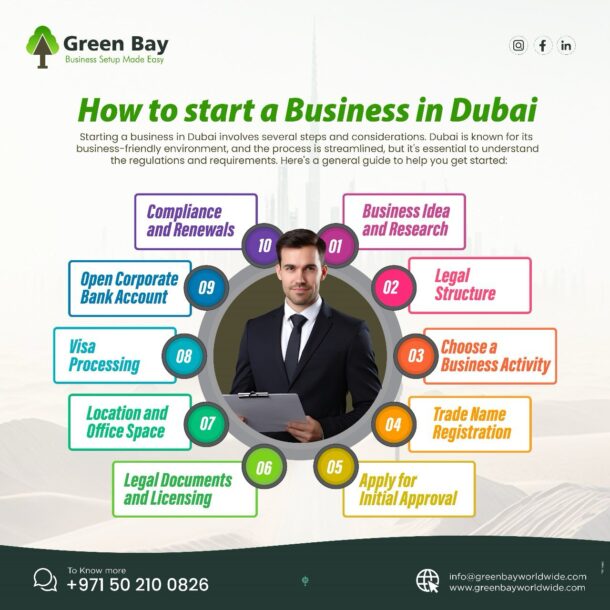
Close
Setting up a company in a Dubai free zone can offer several advantages, including 100% foreign ownership, tax exemptions, and simplified business processes. Each dubai freezone company has its own set of regulations and requirements, so it’s essential to choose the one that best suits your business needs. Here is a general guide on how to set up a free zone company in Dubai:
Dubai has numerous free zones, each catering to specific industries. Examples include Jebel Ali Free Zone (JAFZA), Dubai Multi Commodities Centre (DMCC), Dubai Airport Free Zone (DAFZA), and many more.
Choosing the right free zone company in Dubai for your business involves considering various factors to ensure alignment with your goals and operational requirements. Here’s a step-by-step guide to help you make an informed decision:
Clearly understand the nature of your business activities. Different dubai freezone company cater to specific industries, so identifying your primary activities will help narrow down your options.
Research the focus of each free zone. Dubai has specialized zones for various industries, such as technology, media, healthcare, logistics, and more. Choose a free zone that aligns with your industry.
Determine your desired ownership structure. Most free zones in Dubai allow 100% foreign ownership, but there may be exceptions or restrictions in certain sectors. Confirm the regulations of each free zone in this regard.
Evaluate the setup costs, annual license fees, and other associated expenses in each free zone. Consider your budget constraints and choose a free zone that offers cost-effective solutions without compromising on quality.
Assess the infrastructure and facilities provided by each free zone. Consider your business needs in terms of office space, warehousing, and technology requirements. Ensure the free zone can accommodate your operational requirements.
Consider the geographical location of the free zone. Assess proximity to ports, airports, and major transportation routes. This is crucial for businesses involved in import/export and logistics
Selecting the type of dubai freezone company involves understanding the available legal structures and choosing the one that aligns with your business goals and requirements. The most common types of companies in Dubai free zones are Free Zone Establishment (FZE), Free Zone Company (FZCO), and Branch of a Foreign Company. Here’s an overview of each type:
Ownership: An FZE is a single-shareholder company where one individual or corporate entity holds 100% ownership.
shareholders can be multiple.
Some free zones may have specific minimum capital requirements.
An FZCO is a company with multiple shareholders, and the ownership distribution is as per the shareholding structure defined at the time of incorporation.
Requires a minimum of two shareholders and a maximum number as defined by the free zone authority.
Some free zones may have specific minimum capital requirements.
A branch office is an extension of a foreign company, and the parent company retains full ownership.
No specific requirements as it is not a standalone entity.
Some free zones may have specific capital requirements for branch offices.

If you want 100% ownership, you may opt for an FZE. If you prefer shared ownership, an FZCO may be more suitable. If you want to operate as an extension of a foreign company, a branch office is an option.
Decide on the number of shareholders associated with your business. If you have multiple stakeholders, an FZCO is appropriate. For single ownership, consider an FZE.
Evaluate the flexibility each type of company offers. FZCOs are more flexible in terms of the number of shareholders, while FZEs are suitable for single ownership. Branch offices allow you to extend an existing foreign business into the free zone.
Review the minimum capital requirements, if any, associated with each type of company. Different free zones may have varying capital requirements, and this can impact your decision.
Consider the legal structure that aligns with your business model and future growth plans. Each type of company has its advantages, and the right choice depends on your specific needs.
Familiarize yourself with the regulations of the chosen dubai freezone company. Some free zones may have specific rules governing the types of companies allowed, and understanding these regulations is crucial.
Seek advice from business consultants or legal experts who specialize in Dubai free zone setups. They can provide insights into the pros and cons of each company type and guide you based on your unique business requirements.
Think about your long-term business goals and how the chosen company type aligns with your expansion plans. Ensure that the selected type allows for future growth and modifications.
Consider the costs associated with each type of company, including setup fees, annual fees, and any additional costs. Factor these into your decision-making process.
Once you’ve chosen the type of company, prepare and submit the required documentation to the free zone authority to initiate the setup process.
The required documents for opening a company in a Dubai free zone can vary slightly depending on the specific free zone and the type of business activity you intend to engage in. However, there are common documents that are typically required across many dubai freezone company. Here is a general list of documents you may need:
Application Form: Complete and submit the application form provided by the chosen free zone authority.
Business Plan: A detailed business plan outlining your company’s activities, objectives, and financial projections.
Passport Copies: Passport copies of all shareholders, directors, and the appointed manager.
Visa Application Forms: Visa application forms for each shareholder, director, and employee who will require a visa.
No Objection Certificate (NOC): If applicable, a No Objection Certificate from your current employer (for individuals who are currently employed).
Proof of Address: Utility bill or tenancy agreement for the proposed office address within the freezone.
Bank Reference Letter: A reference letter from the shareholders’ bank, confirming their good standing.
Educational Certificates: Copies of educational certificates for shareholders and directors may be required.
Board Resolution: A board resolution from the parent company (for branch setups) or a resolution from the shareholders (for FZE and FZCO setups).
Most free zones in Dubai require companies to have a physical office or workspace within the free zone as part of the company setup process.
You will need to submit a copy of the signed lease agreement along with your company registration documents during the application process.
The lease agreement typically needs to be valid for a specific duration, and it should cover the minimum office space requirements set by the free zone authority.
Some free zones offer virtual office solutions, allowing companies to fulfil the office requirement without the need for a physical office space. However, the availability of virtual offices may vary among Dubai freezone company.
Some free zones may provide options for shared office spaces or flexi desks as an alternative to a dedicated office. This can be a cost-effective solution for startups.
The lease agreement may need to be registered with the free zone authority, and the details of the office location will be mentioned in the company’s trade license.
The physical office requirement is often linked to the number of employments visas a company can obtain. The size and type of office space may influence the visa quota.
Pay the relevant fees for company registration, license issuance, and any other applicable charges.
Once your application is approved and all fees are paid, you can collect your business license.
11. Visa Process:
To apply for a residence visa, you will need to initiate the employment visa process. This involves the following steps:
Medical Examination: Undergo a medical examination at an approved medical centre in the UAE. This is to ensure that you are medically fit to reside in the country.
Entry Permit: Your sponsoring company (your own free zone-registered company) will apply for an entry permit for you. This permit allows you to enter the UAE for the purpose of obtaining your residence visa.
Arrival and Status Change: Once the entry permit is approved, enter the UAE. Within a certain period (often 60 days), your status will need to be changed to residence visa status.
Biometrics and Stamping: Visit the immigration office with the necessary documents for biometrics (fingerprinting) and visa stamping.
Emirates ID Application: Apply for an Emirates ID, a mandatory identification card for residents in the UAE.
Status Adjustment: After the residence visa is stamped in your passport, you will be eligible to live and work in the UAE. Ensure that you comply with all visa regulations and renew your residence visa before it expires.
Passport copies of the applicant.
Passport-size photos.
Copy of the entry stamp in the passport.
Copy of the Emirates ID application.
Medical fitness certificate.
Copy of the employment contract.
Lease agreement for the office space.
Copy of the company’s trade license.
Application forms (provided by the Dubai freezone company authority).
Ensure compliance with ongoing requirements, such as annual renewals, audits, and reporting.
The specific requirements and procedures can vary between free zones, so it’s crucial to check with the chosen free zone authority for the most accurate and up-to-date information.
Consulting with a business setup consultant or legal advisor in Dubai is recommended to navigate through the specific requirements and procedures efficiently.
Always ensure you are aware of the latest regulations and requirements, as they may change over time. It’s also beneficial to seek professional advice to ensure a smooth and compliant company setup process in Dubai.